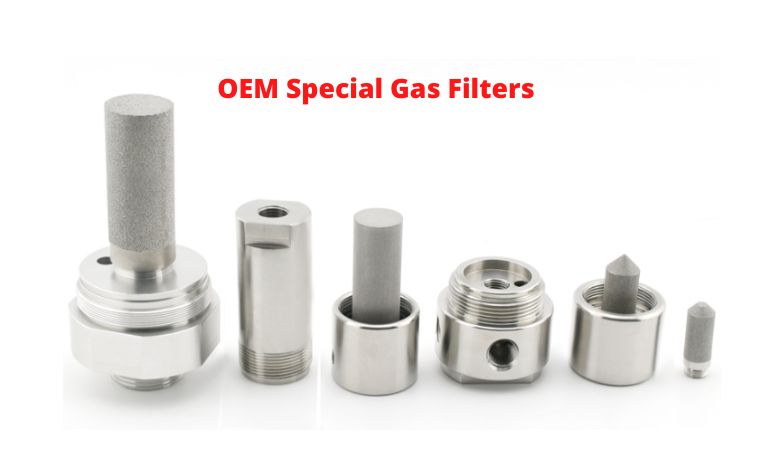-
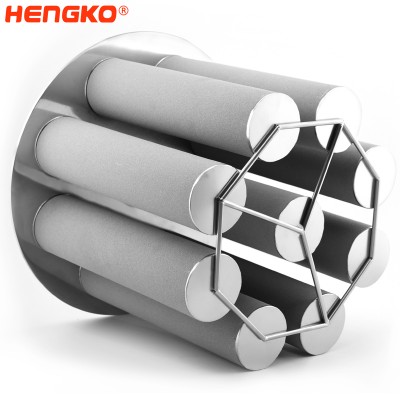
High Purity Gas Purifiers Sintered Filter for Single Low Flow Rate Applications
Gas Purifiers Sintered Filter for Single, Low Flow Rate Applications Designed for high purity and ultra high purity applications that require impurity levels...
View Detail -
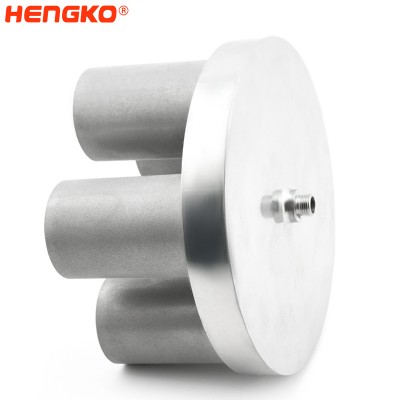
Porous Metal Filter Media and OEM Sintered Stainless Steel Filter for Hydrogen Gas
The porous metal filter media of the present invention includes a filtering unit which removes impurities from hydrogen gas, and a one-way control valve whi...
View Detail -
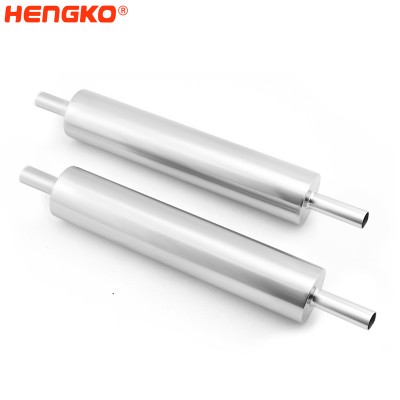
Sintered In-line Metal Gas Filter for Semiconductor Gas Purification System
Sintered in-line metal gas filters work to expel impurities including moisture, oxygen, carbon dioxide, carbon monoxide, hydrocarbons and metal carbonyls by ...
View Detail -
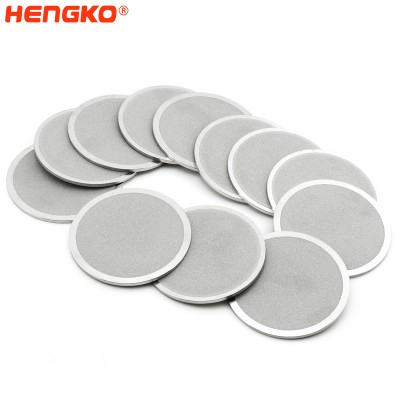
Sintered porous metal filter disc 20 micron for Gas purification and analysis
Achieve Unparalleled Gas/Solids Separation with HENGKO's Sintered Stainless Steel Filter Discs! Our filtration systems, featuring sintered stainless ...
View Detail -
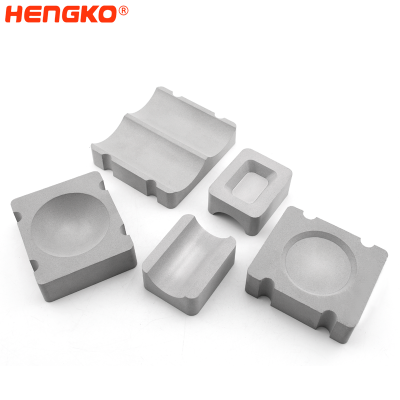
Sintered metal Gas / Solids Venturi Blowback (GSV) GSP filter OEM Services
Custom Sintered metal Gas/Solids Venturi Blowback (GSV) GSP filter Sintered metal filters have been used for hot gas filtration in various plants in the che...
View Detail -
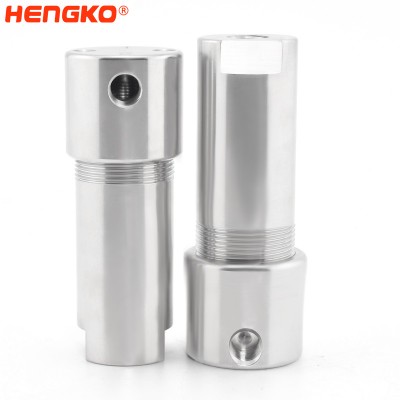
UltraPure UHP Compressed Air Stainless Steel High Pressure Inline Filter Sampling Filtr...
The HENGKO Gas Sampling Filter can separate solids from gases in a wide variety of applications. Uses include process filtration, sampling filters, polishing...
View Detail -
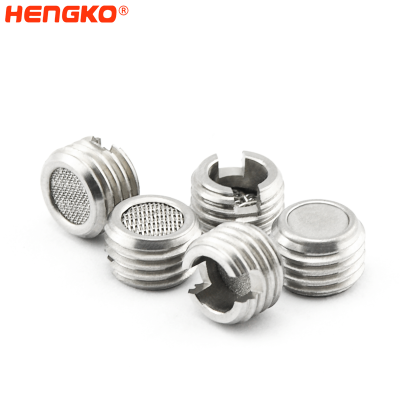
Sintered Stainless Steel Porous Metal Powder Filter Ued For Gas Sensor Sampling Probe
Products Description A pneumatic component for a sampling of gas sensors, which is used to reduce pressure fluctuations The gas sampling head is a special g...
View Detail -
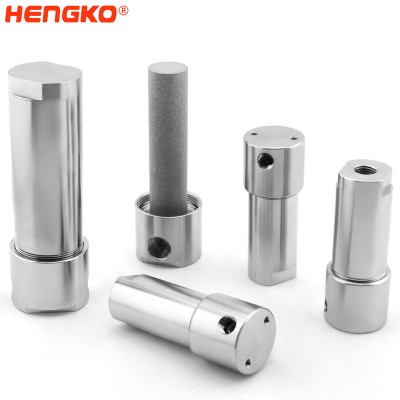
Sampling System for Gas Analyzer – High Pressure Inline Filter UltraPure UHP
HENGKO High-pressure gas filter for reliable protection against impurities. This market for filtration, separation and purification also complements the deve...
View Detail -
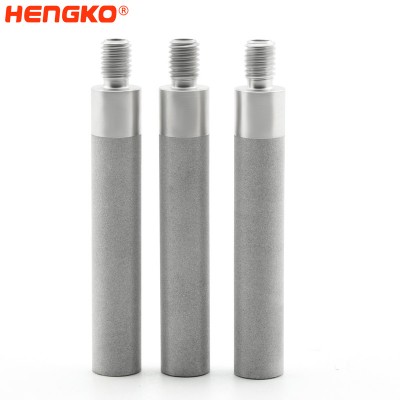
HENGKO Sintered Filter Cartridge for Process Gas and On-Line Analysis
Gas and Sample Filtration For process Gas and On-Line Analysis The filtration of gases is essential in a vast range of applications, yet only three m...
View Detail -
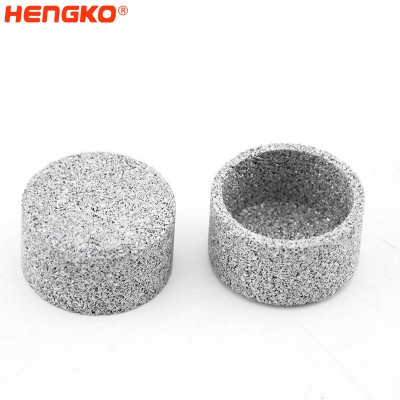
Explosion Proof Sintered Filter Gas Sensor Housing for Process and Analytical Gas Appli...
Gas sensor housing are safety devices that allow flow of combustible gases while preventing ignition. The (sintered metal filter media) gas sensor housing pr...
View Detail -
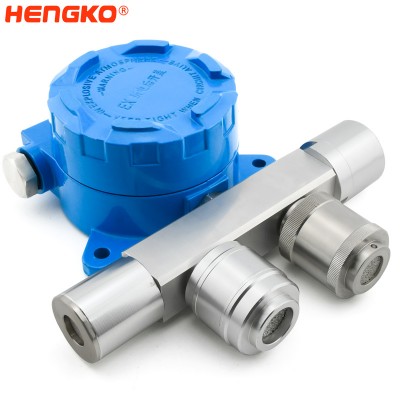
Commercial Industrial Gas Flame Detectors with Natural Gas Alarms
Save Seconds – Save Lives Safety failings lead to tragic consequences. In gas detection, every second counts, and choosing the right gas detection solution i...
View Detail -
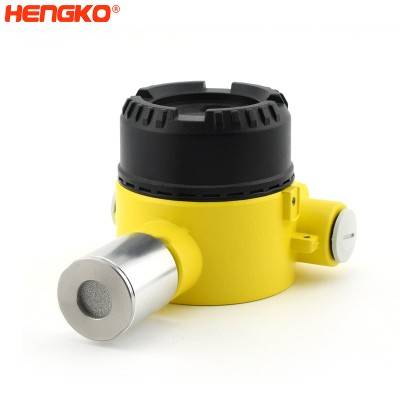
ON-line Type Smart Single Gas Detectors – GASH-AL01
Single gas detector is mainly be used to detect the leaked flammable gas or poisonous gas exposed to environment. It can service the industry of petroleum ch...
View Detail
Types of Gas Filtration
As we Know, There are many different types of gas filtration, depending on the specific application.
Some of the most common types of gas filtration include as follow:
1. Absolute filtration:
This type of filtration removes all particles of a certain size or larger. Absolute filters are often used in
critical applications where even small particles can cause problems, such as in the semiconductor
industry and in medical devices.
2. Coalescing filtration:
This type of filtration removes liquid droplets from a gas stream. Coalescing filters are often used in
applications where moisture can cause problems, such as in oil and gas production and in
compressed air systems.
3. Adsorptive filtration:
This type of filtration removes gases and vapors from a gas stream by adsorption. Adsorptive filters
are often used in applications where emissions control is required, such as in power plants and in
chemical processing facilities.
3. Catalytic filtration:
This type of filtration uses a catalyst to convert harmful gases into less harmful gases. Catalytic filters
are often used in applications where emissions control is required, such as in vehicles and in industrial plants.
In addition to these general types of gas filtration, there are also many specialized types of gas filtration, such as:
* HEPA (high-efficiency particulate air) filtration:
HEPA filters are designed to remove very small particles from a gas stream, down to 0.3 microns in diameter.
HEPA filters are often used in hospitals and other cleanroom environments.
1. ULPA (ultra-low penetration air) filtration:
ULPA filters are even more efficient than HEPA filters, removing 99.999% of particles 0.12 microns in diameter
or larger. ULPA filters are often used in critical applications where even the smallest particles can cause problems,
such as in the pharmaceutical industry and in semiconductor manufacturing.
2. Activated carbon filtration:
Activated carbon filters are used to remove organic vapors and other contaminants from a gas stream. Activated
carbon filters are often used in applications where odor control is required, such as in wastewater treatment plants
and in food processing facilities.
The type of gas filtration that is best for a particular application depends on a number of factors, including the type of gas being filtered, the size of the particles to be removed, and the desired level of filtration efficiency.
Main Features of Sintered Metal Gas Filters
Sintered metal gas filter is a type of gas filtration technology that uses sintered metal materials to filter gases. Some of the main features of sintered metal gas filtration include the following:
1. High filtration efficiency: Sintered metal filters have high efficiency, meaning they can effectively remove contaminants from gases.
2. Durability: Sintered metal filters are made from metal, making them more durable than other filters. They can withstand high temperatures and pressures and are resistant to corrosion.
3. Versatility: Sintered metal filters can be used in various applications, including the filtration of air, gas, and liquids.
4. Customizability: Sintered metal filters can be customized to meet the specific needs of different applications. For example, they can be made in different sizes and shapes to fit different equipment.
5. Chemical resistance: Sintered metal filters are resistant to a wide range of chemicals, making them suitable for use in harsh environments.
6. High-temperature tolerance: Sintered metal filters can operate at high temperatures, making them suitable for high-temperature applications.
7. Low-pressure drop: Sintered metal filters have a low-pressure drop, meaning that they do not significantly resist the flow of gas through them. This makes them energy efficient and can help reduce operating costs.
8. Long lifespan: Sintered metal filters have a long lifespan and do not need to be replaced as frequently as other filters. This can help reduce maintenance costs and downtime.
Main Application of Gas Filter
Gas filter is used in various applications to remove contaminants from gases. Some of the main applications of gas filtration include:
1. Industrial processes: Gas filtration is often used to remove contaminants such as particulates, moisture, and chemicals from process gases.
2. Air purification: Gas filtration is used in air purification systems to remove pollutants such as dust, allergens, and chemical vapor.
3. Medical equipment: Gas filtration is used in medical equipment such as ventilators and anesthesia machines to remove contaminants from breathing gases.
4. Food and beverage processing: Gas filtration is used in food and beverage processing to remove contaminants from gases used in the production and packaging of food and beverages.
5. Environmental protection: Gas filtration is used in environmental protection applications to remove pollutants from gases emitted by industrial processes or vehicles.
6. Energy production: Gas filtration is used in energy production, such as in natural gas processing and power generation, to remove contaminants from gases used as fuel.
7. Laboratory equipment: Gas filtration is used in laboratory equipment to remove contaminants from gases used in scientific research and experimentation.
8. Aerospace: Gas filtration is used in the aerospace industry to remove contaminants from gases used in aircraft propulsion and life support systems.
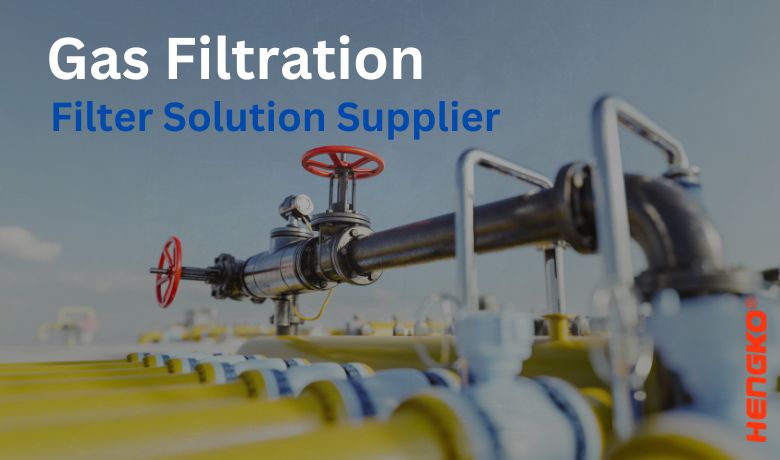
What Kind of Gas Need to Do Gas Filtration ?
Gas filtration is a crucial process in many industries and applications. Different types of gases require unique filtration methods, depending on their specific characteristics and the application at hand. Here are some common types of gases that often need filtration:
1. Natural Air Filters : Air filtration is one of the most common and necessary processes, especially in environments where air quality can significantly impact human health or product quality. For instance, in manufacturing clean rooms, hospitals, or HVAC systems, air filters are used to remove pollutants, allergens, and microbial contaminants.
2. Gas Turbine Filters: Natural gas filtration is crucial in the oil and gas industry. This process helps to remove impurities and contaminants like dust, dirt, oil, water, and condensates that can lead to corrosion and damage to equipment and pipelines.
3. Hydrogen Filter: Hydrogen filtration is often required in fuel cells and hydrogen production plants. The filtration process removes contaminants such as carbon monoxide, carbon dioxide, and methane that could affect the performance of fuel cells or the purity of produced hydrogen.
4. Oxygen Filters: In medical and industrial settings, oxygen filtration is necessary to remove impurities that could compromise patient safety or industrial processes. Filtration of oxygen gas ensures it is safe and efficient for use in applications such as medical oxygen supplies, metal cutting, or welding.
5. Nitrogen Filter: In industries such as food packaging, electronics, and pharmaceuticals, nitrogen gas is often filtered to ensure purity and prevent contamination of products. For instance, in food packaging, filtered nitrogen can help preserve freshness by displacing oxygen that could lead to food spoilage.
6. Sulfur Hexafluoride (SF6): SF6 is a potent insulating gas used in electrical equipment like circuit breakers and switchgear. Filtration of this gas is essential during its recovery and reuse to remove impurities that could impact its insulating properties or harm the equipment.
7. Carbon Dioxide (CO2) Filter : In industries such as brewing and beverage, carbon dioxide filtration is crucial to ensure the purity of CO2 used for carbonation processes. Impure CO2 can affect the taste and quality of the end product.
8. Helium Filters: In applications such as MRI machines, helium is filtered to ensure its purity and optimal performance of the equipment. Impurities in helium can cause cooling inefficiencies and potentially damage the equipment.
FAQs for Gas Filter
1. What is Gas Filter, and Why is it Important ?
Gas filtration refers to the process of removing contaminants from a gas stream. Some reasons include improving the gas quality, protecting equipment from damage caused by contaminants, and ensuring personnel safety. Gas filtration is an important process in many industries, including chemical processing, pharmaceutical manufacturing, oil and gas production, and power generation.
2. How does sintered metal gas filter work schematic diagram?
Sintered metal gas filters work on the principles of depth filtration and surface filtration. They are engineered by compressing metal powders into a defined shape and heating the compacted material (without reaching the melting point) to create robust and porous structures.
Here's a simplified explanation of how sintered metal gas filters operate:
-
Inlet: The unfiltered gas is introduced into the sintered metal filter. This gas can contain various contaminants such as dust, particulates, or other impurities depending on the gas source and application.
-
Filtration Process: As the gas passes through the porous sintered metal filter, the impurities get trapped within the intricate network of pores. The filtration can occur in two ways:
-
Depth Filtration: In this process, the contaminants are trapped and retained throughout the depth of the filter media. It's ideal for removing smaller particles and provides high dirt-holding capacity.
-
Surface Filtration: In this process, contaminants are trapped on the surface of the filter. It's most effective for larger particles and prevents them from passing through the filter.
-
-
Outlet: The cleaned gas, free of contaminants, then exits the filter and continues to its intended application, whether that's a manufacturing process, a specific device, or an industrial system.
Sintered metal filters are particularly known for their durability, high mechanical strength, and high-temperature resistance. They can be cleaned and reused multiple times, which contributes to their cost-effectiveness and environmental sustainability. They are also capable of handling high pressure differentials, which makes them suitable for various challenging applications.
Do you require a high-performance filtration solution for your specific application? Reach out to our team at HENGKO at ka@hengko.com. We're ready to provide expert advice and tailored solutions to meet your needs.
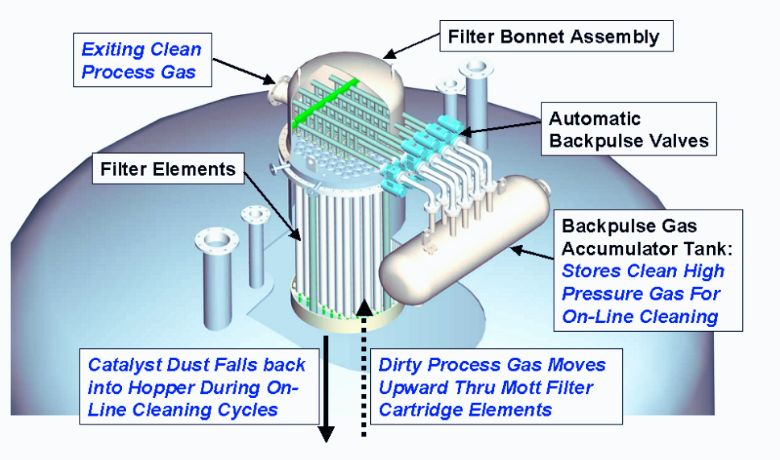
3. What are the benefits of using sintered metal for gas filter?
There are several benefits to using sintered metal for gas filtration:
1.) High strength and durability: Sintered metal filters are strong and resistant to damage, making them suitable for high-pressure and high-temperature applications.
2.) High surface area: The porous structure of sintered metal filters provides a large surface area for contaminants to be trapped, increasing their filtration efficiency.
3.) Chemical resistance: Sintered metal filters resist many chemicals and can be used with corrosive gases.
4.) Customizability: Sintered metal filters can be made in various sizes, shapes, and configurations to meet specific filtration needs.
5. What industries commonly use sintered metal gas filtration?
Sintered metal gas filtration is commonly used in various industries, including chemical processing, pharmaceutical manufacturing, oil and gas production, power generation, and air purification. In these industries, sintered metal filters are used to remove contaminants from gas streams to protect equipment, improve product quality, and ensure the safety of personnel.
6. How do the size and shape of the sintered metal filter affect its performance?
The size and shape of the sintered metal filter can significantly affect its performance. A larger filter will have a greater surface area and may be able to filter more contaminants, but it may also have a higher pressure drop, which can reduce the flow rate of the gas. Similarly, the shape of the filter can also affect its performance. For example, a pleated filter may have a higher surface area and be more efficient at trapping contaminants, but it may also have a higher pressure drop than a non-pleated filter.
7. Can sintered metal gas filters be used with corrosive or abrasive gases?
Sintered metal gas filters can be used with corrosive or abrasive gases. Sintered metal filters are resistant to many chemicals and can withstand high temperatures, making them suitable for harsh environments. However, it is important to select a sintered metal filter compatible with the specific gases being used and to properly maintain the filter to ensure its longevity.
8. How do you properly maintain and clean sintered metal gas filters?
Proper maintenance and cleaning of sintered metal gas filters are important to ensure their performance and longevity. Here are some general guidelines for maintaining sintered metal filters:
Follow the manufacturer's recommendations for filter maintenance and cleaning.
Regularly inspect the filters for signs of damage or excessive contamination.
Use clean, dry compressed air to blow.
9. What are the different types of sintered metal gas filters available?
There are several types of sintered metal gas filters available, including:
1. Pleated filters: These filters have a large surface area and are made from wrinkles or folds in the filter media. They are often used in high-flow applications and can be made in various sizes and shapes.
2. Depth filters: These filters are made from a layer of sintered metal powder that is layered or wrapped around a support structure. The contaminants are trapped within the depth of the filter rather than on the surface.
3. Screen filters: These filters are made from a mesh of sintered metal wires or fibers and are used to remove large particles from gas streams.
4. Membrane filters: These filters have a thin layer of sintered metal on a support structure and are used to remove small particles from gas streams.
10. How do you select the right sintered metal gas filter for your application?
There are several factors to consider when selecting a sintered metal gas filter, including:
*The type of gas being filtered:
Different gases may require different filters or filter media.
* The contaminants being removed:
The size and type of contaminants will determine the pore size and surface area of the filter needed.
* The flow rate of the gas:
The filter must handle the required flow rate without causing an excessive pressure drop.
* The operating temperature and pressure:
The filter must be able to withstand the operating temperature and pressure of the system.
* The chemical compatibility of the filter:
The filter must be resistant to the chemicals in the gas stream.
11. What are the limitations of sintered metal gas filtration?
Some of the limitations of sintered metal gas filtration include the following:
1. High-pressure drop: Sintered metal filters can have a high-pressure drop, reducing the gas flow rate.
2. Limited removal of small particles: Sintered metal filters may not effectively remove small particles, such as those smaller than the pores in the filter.
3. Limited chemical compatibility: While sintered metal filters are resistant to many chemicals, they may not be suitable for all gases.
12. How does sintered metal gas filtration compare to other types of gas filtration?
Sintered metal gas filtration has several advantages over other types of gas filtration, including:
1. High strength and durability: Sintered metal filters are strong and resistant to damage, making them suitable for high-pressure and high-temperature applications.
2. High surface area: The porous structure of sintered metal filters provides a large surface area for contaminants to be trapped, increasing their filtration efficiency.
3. Customizability: Sintered metal filters can be made in various sizes, shapes, and configurations to meet specific filtration needs.
However, sintered metal gas filtration may not be the best choice. For example, other filters, such as activated carbon filters, may be more effective at removing certain contaminants or more suitable for use with certain gases.
13. Are there any safety considerations to be aware of when using sintered metal gas filters?
Yes, there are several safety considerations to be aware of when using sintered metal gas filters:
Follow the manufacturer's instructions for handling and installing the filters.
Use caution when handling the filters, as they may be sharp or have jagged edges.
When handling the filters, wear protective equipment, such as gloves and safety glasses.
Properly secure the filters to prevent them from becoming loose or dislodged during use.
Regularly inspect the filters for signs of damage or excessive contamination and replace them as needed.
Follow proper procedures for cleaning and maintaining the filters to ensure their performance and longevity.
Be aware of the chemical compatibility of the filters and use them only with gases they are designed to handle.
I hope this information is helpful! Let me know if you have any additional questions.
Are you interested in our sintered metal gas filters and have questions about our products? We'd love to help! Email us at ka@hengko.com, and we'll assist you. Our team of experts is here to answer any questions and help you find the right solution for your gas filtration needs. Don't hesitate to reach out – we look forward to hearing from you!
For More Gas Filters Products, You Can Also Check as Follow Video.
Sintered Metal Filters Can Help You to Filter Most Gas Better, Maybe You Can Check Details and Order Some Samples to Test,
Any more questions for the Gas Filtration and Custom Service, Please feel free to contact us by email ka@hengko.com or send
inquiry as follow form. Thanks!
